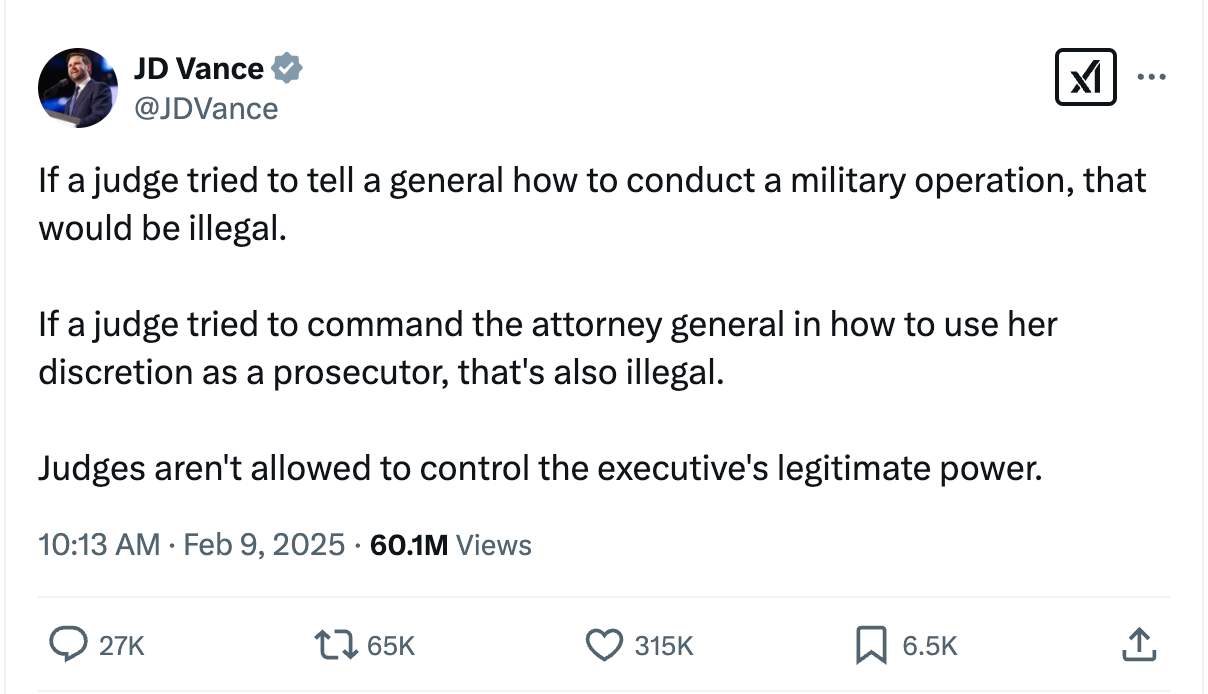FREE FOR ALL: Is the Constitution still in effect?
Or, Vice President JD Vance soft launches monarchy
We are unlocking this post for all readers in the public interest. But producing a newsletter of quality is expensive. If you appreciate what we’re doing, take a moment and subscribe to support independent, truth-telling media today. When you do, you allow us to pay writers and editors what they deserve to hold the powerful accountable and chronicle this time honestly, without fear of billionaires and their whims.
On Sunday, after a federal judge blocked Elon Musk’s team from accessing U.S. Treasury records, Vice President JD Vance objected, claiming judges “aren't allowed to control the executive's legitimate power.”
This may sound like a technical legal debate, but in today’s post we want to argue that it is in fact a declaration of war on the courts and the Constitution. The vice president is trying to lay the intellectual groundwork for American monarchy.
Vance is just straw-manning with hypotheticals about judges telling generals what to do on the battlefield, but that has nothing to do with the actual situation he is addressing. He’s saying that the president should ignore a court order — something that strikes right at the heart of the Constitution’s separation of powers. And he’s creating a pretext for more couping.
This is exactly what the administration has been doing by issuing unconstitutional executive orders like the one “ending” birthright citizenship (which is enshrined in the Constitution), granting unelected private citizens like Elon Musk power over government agencies and elected officials, usurping Congressional power by shuttering government agencies, and straight-up defying the court orders putting a stop to those things.
It’s a long list! And a lot of it has flown under the radar, or it’s been waved away by those who have faith in the resilience of the system.
But the administration’s actions mean one thing: a constitutional crisis is happening — not in the future, but right now. It’s not about “Can he do that?” but about what Trump and Musk are doing already. That’s not a hypothetical.
Vance is right about two things, however, and they are worth keeping in mind:
The law is political. As Jay Willis writes over at Balls and Strikes, those who fail to see that will “never realize they are getting their asses beat.” That’s what has been happening to American democracy, and failing to recognize that the law isn’t objective is a big part of why.
The law can’t enforce itself. Restraining orders and stays are essential in slowing down the coup Trump and Musk are carrying out, but the legislative branch and civil society have to act to stop them. It’s not going to happen overnight by magic, or just because a ruling was handed down.
Brian Montopoli digs into the Vance monarchical dream and more below:
The constitutional crisis is now
By Brian Montopoli
As any eighth grader should be able to tell you, the concept of “checks and balances” is foundational to American democracy. In our constitutional system, power is shared between the three branches of government: the executive branch (the president, the cabinet, and the federal agencies), the legislative branch (Congress), and the judicial branch (the courts). The Constitution “balances” power between the three branches so no one entity has too much; if one branch overreaches, the theory goes, the other branches can provide a “check” to keep them in line.
But that system is under attack — right now. And on Sunday, the vice president of the United States made a dangerous statement that could telegraph what the attackers are plotting. Let me explain.
Since January 20, the Trump administration has made a concerted effort to usurp the power of the legislative branch. The Constitution mandates that Congress controls spending, but the administration insists that it can ignore that requirement — and it has. It has also contended that it can ignore laws, like the ban on TikTok, and eliminate agencies created by Congress, like the Consumer Financial Protection Bureau, even though closing agencies requires Congress to act.
To get a sense of just how serious this is, it's worth drilling down into exactly how JD Vance is defending Trump’s and Musk’s blows against the constitutional order. He stops just short of claiming that the executive branch can ignore the judiciary entirely, suggesting that judges are not allowed to constrain the executive branch when its actions are “legitimate.” But that’s a distinction without a difference. The very purpose of the courts is to decide whether the actions of the executive branch are “legitimate” — or if they exceed the scope of its powers as defined in the Constitution. If the executive branch is deciding for itself which actions are “legitimate,” then the courts have no power. The executive branch can do as it pleases. And the president becomes a king.
Vance, a Yale Law School graduate, surely knows how all this should work under the Constitution. He just doesn’t seem to care. Indeed, this is not the first time Vance has made this kind of assertion. In 2021, he said that if the courts try to stop Trump from firing people in government and replacing them with loyalists, Trump should “stand before the country, as Andrew Jackson did, and say, ‘The chief justice has made his ruling. Now let him enforce it.’” Jackson most likely never said that, though he did ignore Worcester v. Georgia, the ruling in question. That says a lot about both Vance’s standards of legal scholarship and the problem of Trump’s fandom for Jackson.
For the most part, the Trump administration has appealed decisions that it does not like. But even a Supreme Court stacked with Republican appointees is unlikely to completely abdicate its responsibility to provide some check on executive power. Indeed, Chief Justice John Roberts — who’s certainly done his part to bolster executive power — has asserted recently that suggestions of “open disregard for federal court rulings” should be “soundly rejected.”
A bigger question now is what happens if the courts continue to rule against Trump — and instead of complying or appealing these decisions, the Trump administration expands on a more dangerous precedent: simply ignoring court decisions, as it has already been doing in some cases.
If Trump continues to defy court decisions, it will mean the end of our system of checks and balances — and the coming of an American monarchy. And that statement by Vance — which was applauded by Musk — suggests that may be exactly where we are headed. Already, many experts say, the administration’s unconstitutional and illegal actions have plunged the country into a constitutional crisis. And as Trump keeps ignoring judges, that crisis will get exponentially worse.
Ultimately, if the administration disregards rulings that constrain its power while wielding the law as a weapon to go after its political enemies, we may find ourselves with a legal system only in the technical sense — the law might exist, but will only serve those in power, and only apply to those the administration wants to control. When it comes to constraining Trump and his allies, the judicial branch’s power will effectively cease to exist.
We may soon know just how bad things will get. On Monday, a judge ordered Trump to “immediately restore frozen funding” for federal grants — funding already authorized by Congress, as laid out by the Constitution. But it’s not clear what will happen if the administration simply refuses to follow the law and keeps the funding frozen, perhaps cutting off payments at their source now that Elon Musk’s team has seized key Treasury systems. In addition, we may be headed toward a major showdown if and when a challenge to one of Trump’s many illegal actions reaches the Supreme Court. It remains to be seen whether the justices attempt to reign him in — or simply sign off on the power grab.
If the high court acquiesces to Trump’s illegal overreach, they’d further solidify the kinglike power they’ve already given to the executive branch. The conservative-dominated court has already granted Trump broad immunity from prosecution, in a decision that constitutional scholar Aziz Rana told us amounted to “a brazen and dangerous expansion of presidential power.”
The court’s decision to sanction “criminal conduct at the highest level,” as law professor Kim Wehle put it when she spoke with us recently, made its unwillingness to take on Trump crystal clear. With partisan courts increasingly using what law professor Ryan Doerfler described as “non-judicial methods” to make their decisions, it should come as no surprise that Americans are, as Judge David S. Tatel told us, losing faith in the judiciary.
It’s tempting to call the courts our last line of defense against an out-of-control executive branch. But the problem is that the three branches must all do their jobs if the system’s going to work. The Trump administration's attack on them — and the legislative branch’s near-total capitulation under the Republican-controlled Congress — is an existential threat to the American system of government.
“Democracies don’t last forever,” Senator Chris Murphy warned on Sunday. “And what those who are trying to destroy democracies want is for everyone to stay quiet, for everyone to believe that the moment isn’t urgent.”
Murphy has called on his Republican colleagues to stand up for the Constitution — even if it means defying Trump. We have seen little evidence to suggest that they will take up his call. But it is not too late. Democrats, even in the minority, have tools to push back with, if they can stick together. And the public — that’s all of us — has a role to play too, pressuring those elected officials, even the ones we don’t agree with, to do the right thing.
We are now in the middle of one of the gravest threats that our system of government has faced. Whether American democracy survives may well depend on whether Republicans in the legislative and judicial branches can finally grow a spine.








